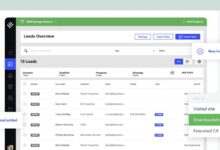Real Estate Brokerage CRM Systems: 7 Ultimate Power Tools for Dominance
In today’s hyper-competitive real estate market, the right technology can be the difference between thriving and merely surviving. Real estate brokerage CRM systems are no longer optional—they’re essential for scaling operations, nurturing leads, and maximizing agent productivity.
1. Understanding Real Estate Brokerage CRM Systems

At its core, a real estate brokerage CRM system is a centralized software platform designed to manage interactions with current and potential clients. Unlike generic CRMs, these systems are tailored specifically for the unique workflows of real estate professionals—handling everything from lead capture and follow-up automation to transaction coordination and post-sale nurturing.
What Sets Brokerage CRMs Apart from Standard CRMs?
While general-purpose CRMs like Salesforce or HubSpot can be adapted for real estate, they lack the industry-specific features that make brokerage CRMs so powerful. Real estate brokerage CRM systems come preloaded with tools such as property matching algorithms, automated drip campaigns for expired listings, and integration with MLS feeds.
- Automated lead routing based on agent availability and specialization
- Custom workflows for buyer, seller, and rental client journeys
- Direct integration with local real estate boards and listing services
These systems are built with the understanding that real estate is relationship-driven and time-sensitive. A missed call or delayed follow-up can cost thousands in lost commissions. That’s why real estate brokerage CRM systems prioritize speed, automation, and personalization.
Core Components of a Modern Brokerage CRM
A robust real estate brokerage CRM system typically includes several key modules that work together seamlessly:
Lead Management: Captures leads from websites, social media, and open houses, then scores and routes them appropriately.Contact Database: Stores detailed client profiles, including preferences, communication history, and transaction status.Automation Engine: Powers drip email campaigns, SMS reminders, and task assignments based on user behavior.Reporting & Analytics: Tracks KPIs like lead conversion rates, agent performance, and campaign ROI..
Transaction Management: Guides clients through the buying/selling process with checklists, document sharing, and e-signatures.”A CRM isn’t just a database—it’s the central nervous system of a modern real estate brokerage.” — Industry Analyst, Inman News
2.Why Every Real Estate Brokerage Needs a CRM System
The real estate landscape has changed dramatically over the past decade.With the rise of digital marketing, instant communication expectations, and data-driven decision-making, brokerages that fail to adopt real estate brokerage CRM systems risk falling behind..
Improving Lead Conversion Rates
One of the most compelling reasons to implement a real estate brokerage CRM system is its ability to boost lead conversion. Studies show that brokerages using CRM systems convert up to 27% more leads than those relying on spreadsheets and manual follow-ups.
How? Because CRM systems ensure that no lead falls through the cracks. Automated workflows trigger immediate responses—within minutes of a lead submission—when engagement is highest. According to National Association of Realtors (NAR), 78% of real estate purchases go to the agent who responds first.
- Instant SMS or email acknowledgment
- Follow-up sequences scheduled over days or weeks
- Behavioral triggers (e.g., website visits, email opens) that prompt personalized outreach
Scaling Agent Productivity
Brokerage success depends on agent performance. Real estate brokerage CRM systems empower agents by automating repetitive tasks, allowing them to focus on high-value activities like client meetings and negotiations.
For example, a CRM can automatically log calls, schedule showings, and send birthday greetings—freeing up hours each week. Some platforms even offer AI-powered scripting suggestions for emails and texts, ensuring consistent, professional communication.
When agents spend less time on admin work, they can handle more clients, close more deals, and increase their income—all of which benefits the brokerage through higher commission splits and retention.
3. Top Features to Look for in Real Estate Brokerage CRM Systems
Not all CRM systems are created equal. When evaluating real estate brokerage CRM systems, it’s crucial to focus on features that align with your business model, team size, and growth goals.
Lead Capture & Integration Capabilities
The best real estate brokerage CRM systems offer seamless integration with lead sources such as Zillow, Realtor.com, Facebook Ads, and your brokerage website. This ensures that every inbound lead is automatically captured and entered into the system without manual input.
real estate brokerage crm systems – Real estate brokerage crm systems menjadi aspek penting yang dibahas di sini.
Look for CRMs that support:
- Two-way sync with IDX/MLS platforms
- Web-to-lead forms with custom fields
- Call tracking and call recording (with compliance)
- API access for custom integrations
For example, Propertyware and Bloomfire offer advanced lead routing logic that directs leads to the most qualified agent based on location, specialty, or availability.
Automation & Workflow Customization
Automation is the backbone of any effective real estate brokerage CRM system. The ability to create custom workflows allows brokerages to standardize client experiences while maintaining a personal touch.
Key automation features include:
- Drip email campaigns for new leads, past clients, and expired listings
- Task reminders for follow-ups, contract deadlines, and renewal dates
- Dynamic content insertion (e.g., inserting property photos or pricing trends into emails)
- Conditional logic that changes workflows based on client behavior
For instance, if a lead views three homes in a specific neighborhood, the CRM can automatically trigger a personalized email with similar listings and suggest a virtual tour.
Mobile Accessibility & App Experience
Real estate is a mobile-first industry. Agents are constantly on the go—showing homes, meeting clients, attending closings. A real estate brokerage CRM system must offer a fully functional mobile app with offline capabilities.
Top-tier CRMs like Follow Up Boss and kvCORE provide native iOS and Android apps that allow agents to:
- Log calls and notes in real time
- Access client profiles and transaction timelines
- Send emails and texts directly from the app
- Update lead status while driving between appointments
Mobile optimization isn’t just a convenience—it’s a necessity for maintaining responsiveness and professionalism.
4. Comparing the Leading Real Estate Brokerage CRM Systems
With dozens of options on the market, choosing the right real estate brokerage CRM system can feel overwhelming. To help narrow the field, let’s compare some of the most popular platforms based on functionality, pricing, and user feedback.
Follow Up Boss: Best for Small to Mid-Sized Brokerages
Follow Up Boss has earned a reputation for its intuitive interface and powerful automation tools. It’s particularly well-suited for brokerages with 5–50 agents who want a balance of simplicity and scalability.
- Strengths: Excellent phone integration, robust lead routing, strong customer support
- Weaknesses: Limited transaction management features compared to competitors
- Pricing: Starts at $59/user/month, with volume discounts for brokerages
One standout feature is its two-way texting capability, which allows agents to communicate with leads via SMS directly from the CRM. This increases response rates and builds trust through familiar communication channels.
kvCORE by Real Geeks: All-in-One Marketing & CRM Platform
kvCORE is more than just a CRM—it’s a full-funnel marketing solution designed specifically for real estate brokerages. It combines lead generation, website building, and CRM functionality into a single ecosystem.
- Strengths: Built-in SEO-optimized websites, AI-driven lead scoring, predictive analytics
- Weaknesses: Steeper learning curve; may be overkill for very small teams
- Pricing: Starts at $197/month for the basic package, with enterprise plans available
What sets kvCORE apart is its focus on data intelligence. The platform uses machine learning to identify which leads are most likely to convert, enabling brokerages to prioritize high-intent prospects.
BoomTown: Premium Service with White-Glove Support
BoomTown targets mid-to-large brokerages looking for a high-touch, fully managed CRM experience. Unlike self-service platforms, BoomTown assigns dedicated success managers to help with onboarding, campaign creation, and performance optimization.
real estate brokerage crm systems – Real estate brokerage crm systems menjadi aspek penting yang dibahas di sini.
- Strengths: Proactive lead nurturing, professional marketing content, hands-on support
- Weaknesses: Higher price point; less flexibility for DIY teams
- Pricing: Custom quotes starting around $300/month per agent
BoomTown’s proprietary “Smart CRM” technology automatically engages leads with personalized content based on their browsing behavior, significantly reducing the workload on agents.
5. Implementing Real Estate Brokerage CRM Systems: A Step-by-Step Guide
Choosing a CRM is only half the battle. Successful implementation requires careful planning, training, and ongoing optimization. Here’s how to roll out a real estate brokerage CRM system effectively.
Step 1: Define Your Goals and KPIs
Before selecting a platform, clarify what you want to achieve. Common objectives include:
- Increasing lead-to-close ratio by 15%
- Reducing average response time to under 5 minutes
- Improving agent adoption rate to 90%+
These goals will guide your vendor selection and help measure success post-implementation.
Step 2: Audit Your Current Lead Flow
Map out how leads currently enter your brokerage—from website forms, Zillow inquiries, open houses, etc. Identify bottlenecks, data silos, and manual processes that could be automated.
This audit will help you determine which integrations are essential (e.g., Zillow Flex, MLS, email marketing tools) and ensure a smooth data migration.
Step 3: Choose the Right Vendor and Plan
Based on your goals and audit, shortlist 2–3 real estate brokerage CRM systems that meet your criteria. Request demos, trial accounts, and speak with current users.
Consider factors like:
- Scalability: Can the CRM grow with your brokerage?
- Support: Is there 24/7 customer service? Onboarding assistance?
- Security: Does the platform comply with data protection regulations (e.g., GDPR, CCPA)?
Step 4: Migrate Data and Configure Workflows
Once you’ve selected a CRM, begin migrating historical client data. Most platforms offer import tools for CSV files or API-based transfers.
Simultaneously, design your core workflows:
- New lead follow-up sequence (Day 0: SMS + email; Day 1: Call attempt; Day 3: Personalized listing email)
- Expired listing outreach campaign
- Post-closing nurture series to encourage referrals
Customize fields, tags, and stages to reflect your brokerage’s unique process.
Step 5: Train Your Team and Launch
Agent buy-in is critical. Conduct hands-on training sessions, create quick-reference guides, and appoint CRM champions within your team.
Start with a soft launch—onboard a few agents first, gather feedback, and refine before full rollout.
6. Maximizing ROI from Real Estate Brokerage CRM Systems
A CRM is an investment, not just an expense. To maximize return on investment, brokerages must go beyond basic usage and leverage advanced strategies.
real estate brokerage crm systems – Real estate brokerage crm systems menjadi aspek penting yang dibahas di sini.
Leverage Data Analytics for Strategic Decisions
Top-performing brokerages use their CRM’s analytics dashboard to identify trends, optimize campaigns, and forecast growth.
Key metrics to monitor:
- Lead source performance (Which channels generate the highest conversion rates?)
- Agent activity vs. results (Are top performers also the most active in the CRM?)
- Time-to-close by client type (Buyers vs. sellers vs. investors)
- Email open and click-through rates
By analyzing this data, brokerages can reallocate marketing budgets, recognize top agents, and refine messaging for better engagement.
Integrate with Marketing Automation
The most powerful real estate brokerage CRM systems integrate seamlessly with marketing automation tools. This allows for hyper-targeted campaigns based on client behavior.
For example:
- A lead who searches “luxury condos in Miami” receives a drip campaign featuring high-end properties, market reports, and video tours.
- A past client who hasn’t engaged in six months gets a re-engagement campaign with a home valuation tool and a personal note.
- Expired listing owners are automatically sent comparative market analyses and seller tips.
These campaigns run on autopilot, ensuring consistent outreach without manual effort.
Use AI and Predictive Lead Scoring
Advanced CRMs now incorporate artificial intelligence to predict which leads are most likely to convert. Predictive lead scoring analyzes factors like:
- Website visit frequency and duration
- Page views (e.g., mortgage calculator, school ratings)
- Engagement with emails and texts
- Demographic and behavioral data
Agents can then prioritize “hot” leads, increasing efficiency and closing more deals in less time.
7. Common Pitfalls and How to Avoid Them
Even the best real estate brokerage CRM systems can fail if implemented poorly. Here are the most common mistakes and how to avoid them.
Lack of Agent Adoption
The #1 reason CRM initiatives fail is low agent adoption. Many agents see CRMs as extra work rather than a tool to help them succeed.
Solutions:
- Involve agents in the selection process
- Provide ongoing training and incentives for usage
- Show ROI: Demonstrate how CRM use leads to more closed deals
Some brokerages tie CRM activity (e.g., logging calls, updating lead status) to bonus structures or recognition programs.
Poor Data Hygiene
A CRM is only as good as the data it contains. Duplicate entries, outdated contact info, and inconsistent tagging can render analytics useless.
Best practices:
real estate brokerage crm systems – Real estate brokerage crm systems menjadi aspek penting yang dibahas di sini.
- Enforce data entry standards across the team
- Run regular cleanup campaigns
- Use validation rules to prevent incomplete records
Set up automated deduplication rules and schedule quarterly data audits.
Over-Customization
While customization is powerful, over-engineering workflows can lead to complexity and confusion. Start simple, then scale as needed.
Advice:
- Begin with 2–3 core workflows (e.g., new lead, expired listing, past client)
- Avoid creating too many custom fields or stages
- Test changes with a small group before enterprise-wide rollout
What is a real estate brokerage CRM system?
A real estate brokerage CRM system is a specialized software platform designed to manage client relationships, automate marketing, track leads, and streamline transactions for real estate brokerages. It centralizes communication, data, and workflows to improve efficiency and increase sales.
How much do real estate brokerage CRM systems cost?
Prices vary widely. Entry-level systems start around $50/user/month (e.g., Follow Up Boss), while all-in-one platforms like kvCORE or BoomTown can range from $200–$500+/month depending on features and service level.
Can CRM systems help generate more leads?
Yes. Many real estate brokerage CRM systems include built-in lead generation tools such as SEO-optimized websites, landing pages, and integrations with Zillow, Realtor.com, and social media ads. They also nurture existing leads to improve conversion rates.
Do CRMs work for both residential and commercial brokerages?
Absolutely. While most CRMs are designed with residential agents in mind, many can be customized for commercial real estate workflows, including lease management, tenant tracking, and investor outreach.
How long does it take to implement a CRM in a brokerage?
Implementation typically takes 2–8 weeks, depending on the size of the brokerage, data migration complexity, and training requirements. Smaller teams can go live in as little as 10 days with proper planning.
Real estate brokerage CRM systems are no longer a luxury—they’re a strategic necessity. From automating lead follow-ups to providing deep insights into agent performance, these platforms empower brokerages to operate more efficiently, close more deals, and deliver superior client experiences. The key to success lies in choosing the right system, implementing it effectively, and fostering a culture of consistent usage. By leveraging the power of real estate brokerage CRM systems, forward-thinking brokerages can gain a decisive competitive edge in today’s fast-moving market.
real estate brokerage crm systems – Real estate brokerage crm systems menjadi aspek penting yang dibahas di sini.
Further Reading:


